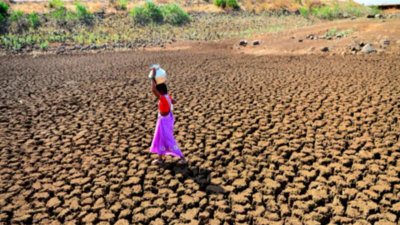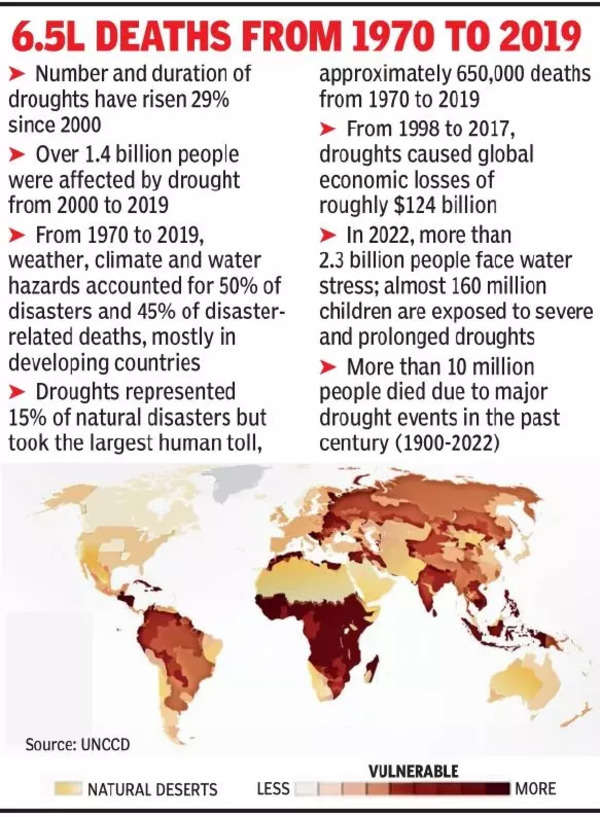- News
- India News
- Droughts reduced India GDP by 2-5% over 20 years: UN
Trending
This story is from May 12, 2022
Droughts reduced India GDP by 2-5% over 20 years: UN
The number and duration of droughts has risen 29% globally since 2000 and the effect of severe droughts is estimated to have reduced India’s gross domestic product (GDP) by 2-5% over the 20 years from 1998 to 2017, said a new report from the United Nations Convention to Combat Desertification (UNCCD) released on Wednesday.

Severe droughts reduced India’s GDP by 2-5% over the 20 years from 1998 to 2017, a UN report has said.
NEW DELHI: The number and duration of droughts has risen 29% globally since 2000 and the effect of severe droughts is estimated to have reduced India’s gross domestic product (GDP) by 2-5% over the 20 years from 1998 to 2017, said a new report from the United Nations Convention to Combat Desertification (UNCCD) released on Wednesday.
While calling for multiple actions, including land restoration to reduce the risk, the report released on the sidelines of the ongoing 15th session of the UNCCD conference (COP15) at Abidjan, Côte d’Ivoire, also flagged that the droughts represent 15% of natural disasters globally but took the largest human toll — approximately 6,50,000 deaths in 50 years (1970-2019).
Globally, droughts caused economic losses of roughly $124 billion during that period. Though severe drought affected Africa more than any other continent with over 300 events recorded in the past 100 years, accounting for 44% of the global total, the highest total number of humans affected by drought were in Asia.
“We are at a crossroads when it comes to managing drought. We need to steer toward the solutions rather than continuing with destructive actions, believing that marginal change can heal systemic failure,” said Ibrahim Thiaw, executive secretary of the UNCCD, while calling for making a full global commitment to drought preparedness and resilience in all regions a top priority.

He said, “One of the best, most comprehensive solutions is land restoration, which addresses many of the underlying factors of degraded water cycles and the loss of soil fertility. We must build and rebuild our landscapes better, mimicking nature wherever possible and creating functional ecological systems”.
The report comes in the backdrop of the UNCCD’s earlier report on ‘global land outlook’ that flagged in April how up to 40% of all ice-free land is already degraded globally, affecting 50% of humanity. It also noted that the current scale of degradation threatens half of global GDP ($44 trillion).
The UNCCD report notes that 128 countries, including India, have already expressed willingness to achieve or exceed 'Land Degradation Neutrality' and nearly 70 countries participated in the Convention's global drought initiative, which aims to shift from reactive approaches to drought to a proactive and risk-reducing approach.
While calling for multiple actions, including land restoration to reduce the risk, the report released on the sidelines of the ongoing 15th session of the UNCCD conference (COP15) at Abidjan, Côte d’Ivoire, also flagged that the droughts represent 15% of natural disasters globally but took the largest human toll — approximately 6,50,000 deaths in 50 years (1970-2019).

Globally, droughts caused economic losses of roughly $124 billion during that period. Though severe drought affected Africa more than any other continent with over 300 events recorded in the past 100 years, accounting for 44% of the global total, the highest total number of humans affected by drought were in Asia.
“We are at a crossroads when it comes to managing drought. We need to steer toward the solutions rather than continuing with destructive actions, believing that marginal change can heal systemic failure,” said Ibrahim Thiaw, executive secretary of the UNCCD, while calling for making a full global commitment to drought preparedness and resilience in all regions a top priority.

He said, “One of the best, most comprehensive solutions is land restoration, which addresses many of the underlying factors of degraded water cycles and the loss of soil fertility. We must build and rebuild our landscapes better, mimicking nature wherever possible and creating functional ecological systems”.
The report comes in the backdrop of the UNCCD’s earlier report on ‘global land outlook’ that flagged in April how up to 40% of all ice-free land is already degraded globally, affecting 50% of humanity. It also noted that the current scale of degradation threatens half of global GDP ($44 trillion).
The UNCCD report notes that 128 countries, including India, have already expressed willingness to achieve or exceed 'Land Degradation Neutrality' and nearly 70 countries participated in the Convention's global drought initiative, which aims to shift from reactive approaches to drought to a proactive and risk-reducing approach.
End of Article
FOLLOW US ON SOCIAL MEDIA










